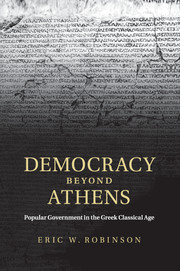Book contents
- Frontmatter
- Contents
- Figures
- Acknowledgments
- Abbreviations
- Introduction
- Chapter 1 Classical demokratiai on the Greek mainland (central Greece and the Peloponnese)
- Chapter 2 Classical demokratiai in western and northwestern Greece (plus Cyrene)
- Chapter 3 Classical demokratiai in eastern Greece
- Chapter 4 The spread of democracy in the Classical period
- Chapter 5 The nature of Classical democracy outside Athens
- Appendix Data for Figures 4.1–4.4
- Bibliography
- Index
- References
Chapter 5 - The nature of Classical democracy outside Athens
Published online by Cambridge University Press: 07 October 2011
- Frontmatter
- Contents
- Figures
- Acknowledgments
- Abbreviations
- Introduction
- Chapter 1 Classical demokratiai on the Greek mainland (central Greece and the Peloponnese)
- Chapter 2 Classical demokratiai in western and northwestern Greece (plus Cyrene)
- Chapter 3 Classical demokratiai in eastern Greece
- Chapter 4 The spread of democracy in the Classical period
- Chapter 5 The nature of Classical democracy outside Athens
- Appendix Data for Figures 4.1–4.4
- Bibliography
- Index
- References
Summary
In the previous chapter we examined the big picture of Greek democratic expansion in the fifth and fourth centuries, recognizing its extent and assessing its causes. This final chapter will tackle another large issue: how might we describe the functioning of democracy outside Athens in the Classical period? While other scholars have occasionally touched upon this issue in broad studies of Greek politics or democracy, none have addressed it in detail. The fifty-four cases of demokratia examined in Chapters 1 through 3 provide a greater variety and quantity of material to work with than previous scholars had available, and they will enable us to attain a better understanding of the nature of democracy as it applied across the Greek world than earlier studies.
The task is complicated by the nature of the material. Not without reason have scholars mostly avoided comparison of different Classical democracies: beyond Athens, the source material declines alarmingly in quantity. But it is not just an issue of quantity. The bits and pieces of testimony that survive vary in type from place to place. Syracuse, for example, has a fair amount of ancient historical narrative concerning major political events, but no inscriptions to help us understand its day-to-day institutional procedures. Meanwhile, at Iasus and similar places, inscriptions detail valuable information about the routine function of the democratic government there, but we lack any narrative accounts concerning political attitudes or political change over time. And for no city other than Athens do we have a wealth of material from genres of literature such as forensic oratory or comedy. Nevertheless, as we shall see, by putting what we have all together one can arrive at some useful conclusions about the commonalities and variations in Greek democratic practice. Many democratic institutions, especially those attested epigraphically, can be broadly compared. And we can glean much about political attitudes too, as we have already seen in a number of cases from Chapters 1–3. One must remain realistic about what we can know about any given case: we make the most progress in the overall picture.
- Type
- Chapter
- Information
- Democracy beyond AthensPopular Government in the Greek Classical Age, pp. 217 - 247Publisher: Cambridge University PressPrint publication year: 2011



